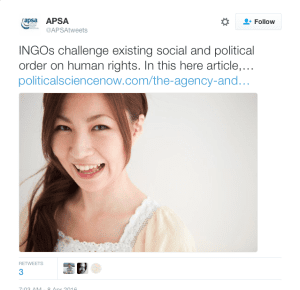I’ve been wanting to write a Duck post about the experience of a woman with visible minority status in IR for quite some time now. I was waiting for the right moment. So thanks to the American Political Science Association (APSA), the professional association for US-trained political scientists, the moment has come.
Yesterday morning, an email came from a friend with a screenshot. The screenshot showed an attractive Asian woman in a frilly top who looks like she’s having a good time looking into the camera. I was confused. Then I read the blurb next to it: this was a promotion from PSNow, one of the official APSA dissemination bullhorns. They were promoting my recent piece with Sarah Stroup in Perspectives on Politics on international nongovernmental organizations (INGOs) and authority in global politics. Instead of contacting us to request a photo, or choosing a stock photo that reflects the subject of our article, APSA decided to accompany this promotion with a photo of a random Asian woman.
I was stunned.
So it’s pretty obvious to me why this is offensive, but let me spell it out.
- What does the Getty Image “Portrait of a young woman smiling” have to do with INGOs? Or authority? Or politics?
- What happened to my co-author?
- What kind of search terms were being used to even generate such a photo that APSA found worthy of posting not just on PSNow, but tweeting?
- Has all of my work on INGOs boiled down to some irrelevant stock image?
- Is it that hard to Google “NGO” for images related to the work being advertised?
- Yea, “all Asians look alike,” but REALLY?!
I emailed APSA. The response I got was that the image was an oversight, and they often choose diverse stock images of people.
Really? I went to check their Twitter feed. See the difference?
It looks like some recent images accompanying their feed look pretty germane to the content of the posts.
Let me say, I really appreciate having the hard work Sarah and I have put in pointed to by our big professional organization. Thank you for noticing our work. Disappointingly, what I found out when I emailed APSA was that in fact, the person in charge of social media for the organization does not know anything about political science. That was at the least one of the official reasons I got for why the picture and the blurb about our piece went together.
An APSA employee thought it was ok to post a photo of a smiling (obviously non-academic) Asian woman to advertise an essay by two female authors – one Asian, one not. But is that the perception that APSA wanted its readers to have of our piece? And just because one of us is a visible minority, does that mean the whole piece of academic thinking boils down to someone who looks like one of the co-authors? Oh and by the way, APSA deleted the post, rather than just replacing the image and issuing a better public apology than “bad choice of stock image.” As though the whole thing didn’t happen. As though it boiled down to some faulty download or spur-of-moment decision, and not a systematic search of images to accompany a purposeful post. Perhaps we were too much trouble. Perhaps it was too hard to just Google something more appropriate. A lesson learned? Don’t be too angry. Be a model minority.
I once took a class about race in grad school, and we read about how race is constructed, how different races and ethnicities are perceived, what it means to be “racialized.” But these experiences aren’t some analytic tool or perspective, like Marxism versus constructivism. These are lived realities. It’s hard to be a professional, racialized person in a career that prizes merit, ideas, and objective evidence. It’s not that you can’t be a visible minority and a woman and do political science and IR. But it’s that the doing creates more challenges the more boxes you can tick off on the diversity scale: gender/sex, race, sexual orientation, religion…intersectionality. There are things that folks who don’t tick off boxes don’t have to do. Being racialized and genderized in our profession is harder than it looks.
It’s time to start talking about this, because when I go to professional meetings, whether for IR or political science more generally, there are more and more women of visible minority status out there. I don’t own this conversation.
What has held me back from writing on this before were a number of things, including not wanting to speak for other women’s experiences, not wanting to raise an issue that affects me but might be seen as not generalizable to others or even trivial, and not wanting to be an “angry ethnic woman.” For a long time, I thought these concerns weren’t as important as my research. Recently, my colleague Steve Saideman has conducted some straw polls (here and here) and found a lack of senior visible minority women in IR (that at least people were willing to share names of), confirming a sense I already had of the field, and of course there has been the work on the citation gap in IR, the gender gap more generally in political science, and both teaching and advancement concerns regarding gender. I’ve been mulling over my experiences as a token Asian female on panels, around decision-making tables, and the expectation that somehow I must study China, or at least be able to speak about it and Asians generally – all, it seems part and parcel not just to being a female in the academy, but being a visible minority female in the academy.
But what happened with APSA today was telling – I wrote to them, telling them of my dissatisfaction with their choice of photo, and instead of issuing a mea culpa and changing the photo with a tweeted retraction, the entire tweet was deleted.
Let’s make sure that these issues do not get deleted.
Wendy Wong is an Associate Professor at the Department of Political Science at the University of Toronto and Director of the Trudeau Center for Peace, Conflict, and Justice at the Munk School of Global Affairs. Her research focuses on the study of NGOs and the importance of the variations between NGOs and the role of foundations in human rights.




I am beyond appalled that this has happened, and by our industry leading association no less. This incident diminishes us all. A full explanation and apology from APSA is warranted, at the highest level.
I’m not surprised (sadly) but I can relate to similar experiences. Thank you for writing this.
Thanks for writing this. APSA owes an apology and some self-reflection.
One cavail: “obviously not academic”? The picture is *not obviously of an academic*, but that’s not the same thing at all. I don’t think any good comes of deciding that this picture is of someone who couldn’t possibly *be* an academic.
Hint, the preceding text refers to smiling. One bit of snark that some folks are missing.
Hm– I now see the joke that you’re inferring, “obviously not an academic because academics don’t smile.” But Wendy Wong below doesn’t say that she was making that joke.
The model is clearly not an academic: she is not nerdy enough, she is too pretty, she does not wear glasses (!!!), and, most importantly, she is way too happy. Anyone who knows academics (especially of the female persuasion) knows that they are never this happy.
On a more serious note, I understand your point: we should avoid the stereotypes that define who looks like an academic. In almost any other setting, your critique would be on point. However, the world of stock photo is all about stereotypes. If the APSA employee who was responsible for this debacle, wanted an image that reflected “an academic,” a photo stock search would have produced the nerdy, serious, bespectacled image. Instead he or she looked for a smiling Asian woman. In the language of photo stock, this photo clearly states -not an academic. Wendy’s comment, therefore, is less about the likely intelligence, profession, or aptitude of the smiling model, and more about the choices and intentions of APSA’s employee. In stock-photo ‘speech,’ the chosen image is “obviously not academic.” A quick google image search demonstrates precisely the type of search words that produced this image. The word ‘academic’ is nowhere to be found.
Lastly, we should not allow this nitpicking to take away from the main point. The issue at hand is not whether or not the woman in the APSA tweet is “obviously not academic,” or “potentially academic.” This tweet would have been offensive even if the chosen model was representing a generic Nobel prize laureate. Wendy and Sara are particular women. They also happen to be smart, successful and talented women. They should not be reduced to any generic photo stock image (especially not one that erases one of them completely and reduces the second to a basic ethnic stereotype).
What Jacob said.
What makes the pictured woman an “obviously non-academic” one? Just curious. She looks about like I look every day, and I don’t want to be mistaken for not being academic.
Thank you for writing this. There are huge blind spots in academia and the promotion of academic work – particularly when the academy functions like a decentralized corporate entity (the marketing department doesn’t know much about the production side). Keep calling them out, because they are everywhere.
Regarding the “non academic” photo – if you look at the keywords for the photo (link provided in post), none of them strike an academic tone, at least to me. Jacob, your critique is well-taken, but I feel that the image is certainly not created to represent academic work, and I stand by the fact that it does not represent the academic content of the piece or either of the authors.
Yes and yes– the picture doesn’t strike an academic tone, isn’t created to represent academic work, and wasn’t responsibly used as a representation of academic work. I just wanted to distinguish, in the spirit of #ILookLikeAProfessor , between “the picture was badly chosen” and “the person depicted in it could not be an academic.”(I’m sure the latter isn’t what you meant, but it’s at least a plausible reading of what you wrote.)
I’m shocked that this is happening. Here. Now. And i’m also shocked by APSA’s response! Well done for writing this Wendy.
Wendy – Thank you for writing this, and I hope it gets copied through the kinds of networks you know so much about to every member of APSA who is available on social media, and to plenty of people who are not. Although it might seem hard to believe that the association could still, after all these years, be clueless, it clearly is. It’s genuinely disgusting. I will write to APSA myself, and I suggest that others do the same. And that people send this link to their friends.
Really outrageous on APSA’s part. I’m appalled. They need to own up to this rather than pretend it never happened. And how can you rely on a social media person who knows nothing about the profession’s content or members? It’s beyond stupid & inept. Thank you for sharing this.
I love the pic. Reminds me of the only asian woman that would go out with me #suzywongrocks
This is clearly outrageous.
Only Donald Trump will shut down the academic and NGO free rides.
Vote Trump!
Must have been a REALLY slow work day in Toronto to blow up over such a stupid reason.
Maybe you could elevate your work by not being a giant crybaby.. just saying’….
you political scientist are too sensitive.
economist never get worked up over this sort of nonsense…but then again, we do lead the way in social sciences…